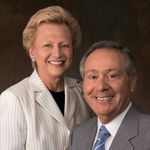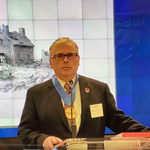The Abramson Family Professorship in Anesthesiology
1fc9
Established in 2019, the Abramson Family Professorship in Anesthesiology supports a faculty member in the Department of Anesthesiology and Critical Care.
In 2002, the Cancer Center was renamed the Abramson Cancer Center of the University of Pennsylvania to recognize the extraordinary generosity and support of the Abramson family. To enhance cancer care for families and patients throughout the Philadelphia region, the family has established several endowed professorships, founded a cancer research institute, and annually funded additional research and care programs at Penn Medicine. Their philanthropy and service have been instrumental in the development of the Abramson Cancer Center into a position of national leadership.
Leonard Abramson is the Founder of U.S. Healthcare and a major philanthropist in the Philadelphia region. Madlyn K. Abramson received her undergraduate and master’s degrees from Penn. She served as a Trustee Emerita of the University of Pennsylvania; Member Emerita of the Trustees’ Council of Penn Women; Honorary Chair of the Abramson Cancer Center Director’s Leadership Council; and served on the Penn Medicine Board of Trustees 1986 until her passing in 2020.
 Current Chairholder
Current Chairholder
Joseph S. Savino, MD
Joseph S. Savino, MD is the inaugural holder of the Abramson Family Professorship in Anesthesiology. He serves as Vice Chair of Operations and Clinical Director for the Department of Anesthesiology and Critical Care at the University of Pennsylvania Health System. For decades, Dr. Savino has been a leader in using advanced imaging technology to dramatically improve care for cardiac surgery patients.
Dr. Savino immigrated from Italy to the U.S. in 1963 with his father and brother at the age of five. They joined his mother in the Germantown neighborhood of Philadelphia. He described those days as, “A frightening time. We had no language, and my father had no work. We stayed with strangers until our parents could settle.” Education followed in the public schools of inner city Philadelphia, ending in graduation from Central High School. Dr. Savino then earned his BA from the University of Pennsylvania and medical degree from Harvard.
He returned to Penn to be near his family. A photographer, Dr. Savino intended to pursue a career in radiology. Instead, he discovered a passion for caring for high acuity patients in a hospital setting. He completed an internship and residency in anesthesiology at HUP followed by a fellowship in cardiac and neurosurgical anesthesia. He joined the faculty in 1989.
“The academic landscape was wide open then,” he said. “Norig Ellison, MD, Chief of Cardiac Anesthesia, was my mentor. In my second year he asked if anyone was interested in chaperoning a new technology called TEE (TransEsophageal Echocardiography) from the outpatient clinics to the high acuity Card ORs. I raised my hand, Norig offered moral support, and away I went.”
Interdepartmental collaboration became their theme. Cardiologists brought expertise in echocardiology; Dr. Savino added his knowledge of the perioperative care of cardiac surgery patients. With the cardiologist Nathaniel Reichek, MD, Dr. Savino did all the TEE at Penn, 50 cases in their first year. “We taught each other,” said Dr. Savino, “and a friendship brewed beyond the clinics.” The program grew at Penn as the pair published, earned promotions and gained national recognition.”
Over the years, backed by research and innovation, the camera changed. Images grew more precise, real-time information more impactful. Patients received better surgery. “We were able to look inside the heart while it was beating, a view even the cardiac surgeons envied. Because of TEE we could be confident in the heart repair of every patient leaving the cardiac OR.”
Among his honors, Dr. Savino has been recognized in Best Doctors in America many times. He has also been elected to Penn Medicine’s Academy of Master Clinicians
Today the Heart and Vascular Intensive Care Unit performs close to 3,000 open heart surgeries each year. TEE is now essential to assessing heart function and informing decisions about perioperative care. It has become the standard of care in nearly every cardiac operation in the world.
“This improvement in care didn’t happen only at Penn,” said Dr Savino. “Centers around the country were working in parallel to us or following suit. But much of this advance started here. I have been called one of the founding fathers of intraoperative echocardiography, but that isn’t correct. I couldn’t do it alone. It wasn’t done alone; it was done together."

